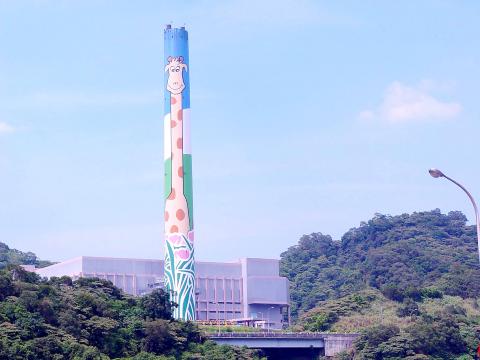The Muzha Refuse Incineration Plant smokestack in Taipei’s Muzha District (木柵) is to be redecorated with images of Taiwanese blue magpies, banyan trees and rhododendrons, Taipei City Mayor Ko Wen-je (柯文哲) said on Wednesday.
The 150m smokestack currently features images of giraffes.
Ko in a Facebook post cited wear and tear as the reason for the new paint job.

Photo provided by the Environmental Protection Administration
The change is part of a planned refurbishment, which will see the plant’s exhaust gas treatment and power and electric systems upgraded, Ko wrote, adding that the public’s standards regarding air quality have continuously risen.
The refurbishment would reduce the plant’s emissions, increase the power it generates from waste heat by 6 million kilowatt-hours per year, and return its capacity to more than 1,000 tonnes of waste per day, Ko said.
Liang Hung-lang (梁宏郎), who heads the plant, had said on Monday that the image would be kept secret until it was painted at the end of the year.

Photo provided by the Environmental Protection Administration
The giraffes have remained on the smokestack for 24 years, Ko said, adding that many people mistakenly believe that it marks Taipei Zoo, which is also located in the area.
The new images are more representative of the city’s ecological environment and would better blend into the scenery, Ko said, adding that they were created by local artists Chen I-ming (陳一銘) and Lin Chia-wei (林家蔚).
The Taiwanese blue magpie, the banyan tree and the rhododendron are the city’s official bird, tree and flower, the Taipei City Government’s Department of Environmental Protection said in a statement.

Alain Robert, known as the "French Spider-Man," praised Alex Honnold as exceptionally well-prepared after the US climber completed a free solo ascent of Taipei 101 yesterday. Robert said Honnold's ascent of the 508m-tall skyscraper in just more than one-and-a-half hours without using safety ropes or equipment was a remarkable achievement. "This is my life," he said in an interview conducted in French, adding that he liked the feeling of being "on the edge of danger." The 63-year-old Frenchman climbed Taipei 101 using ropes in December 2004, taking about four hours to reach the top. On a one-to-10 scale of difficulty, Robert said Taipei 101

Nipah virus infection is to be officially listed as a category 5 notifiable infectious disease in Taiwan in March, while clinical treatment guidelines are being formulated, the Centers for Disease Control (CDC) said yesterday. With Nipah infections being reported in other countries and considering its relatively high fatality rate, the centers on Jan. 16 announced that it would be listed as a notifiable infectious disease to bolster the nation’s systematic early warning system and increase public awareness, the CDC said. Bangladesh reported four fatal cases last year in separate districts, with three linked to raw date palm sap consumption, CDC Epidemic Intelligence

Taiwanese and US defense groups are collaborating to introduce deployable, semi-autonomous manufacturing systems for drones and components in a boost to the nation’s supply chain resilience. Taiwan’s G-Tech Optroelectronics Corp subsidiary GTOC and the US’ Aerkomm Inc on Friday announced an agreement with fellow US-based Firestorm Lab to adopt the latter’s xCell, a technology featuring 3D printers fitted in 6.1m container units. The systems enable aerial platforms and parts to be produced in high volumes from dispersed nodes capable of rapid redeployment, to minimize the risk of enemy strikes and to meet field requirements, they said. Firestorm chief technology officer Ian Muceus said

MORE FALL: An investigation into one of Xi’s key cronies, part of a broader ‘anti-corruption’ drive, indicates that he might have a deep distrust in the military, an expert said China’s latest military purge underscores systemic risks in its shift from collective leadership to sole rule under Chinese President Xi Jinping (習近平), and could disrupt its chain of command and military capabilities, a national security official said yesterday. If decisionmaking within the Chinese Communist Party has become “irrational” under one-man rule, the Taiwan Strait and the regional situation must be approached with extreme caution, given unforeseen risks, they added. The anonymous official made the remarks as China’s Central Military Commission Vice Chairman Zhang Youxia (張又俠) and Joint Staff Department Chief of Staff Liu Zhenli (劉振立) were reportedly being investigated for suspected “serious